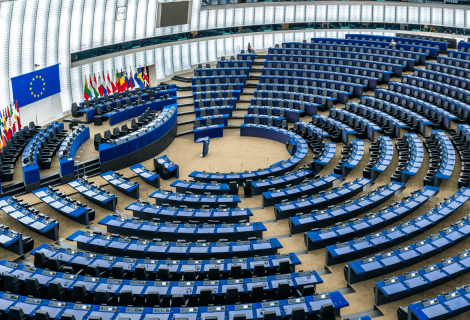What can we expect from the new European Parliament and EU leadership?

Reaction to the EU elections
New MEPs are now elected and set to start their new legislative mandate for the 2024-2029 term. The new power configuration is not entirely different from the earlier term. The Far right has grown its ability to influence the new EU agenda but will fail to form a majority while the (former) Pro-EU majority still holds. Although Greens and Liberalssuffer the most important loss and will lose capacity to be decisive. There is a major surge of unaffiliated MEPs who may play a role in reshuffling existing groups and shaping a new political cycle. This growing fragmentation makes alliance conformation in the EP less predictable. While the pro-EU majority has made clear that they would not work with the far right (which includes ECR in their views), the key question is to what extent Ursula von der Leyen, now officially proposed by the Council as the new President, will seek the support of ECR. This will then reflect in the influence that the Far Right, particularly ECR, will have in shaping the external action agenda for the next five years. ActionAid has found that ECR has scored the least in its manifesto on climate justice, economic justice and women and migrant rights. If Ursula von der Leyen seeks to extend its majority to the right, one can expect a further shift away of the European external and development policies from multilateralism and progressive external policies. As we believe the key questionis whether the new EU compass will look at the long-term systemic measures to address citizens' and the planet's needs or whether we will continue in a blind spot with short-term false solutions. Anti-European forces are gaining traction after the elections due to voter’s discontent and we have probably the last chance before starting an unknown path…
There are legitimate concerns in the EU about a more geopolitically fragmented world in which the EU’s values and interests are challenged. Yet, while it might be tempting to increasingly “(geo)politicize”, “securitize” and “militarize” its external action to cope with these changes, we believe the EU should hold strong on its support for a rules-based and democratic multilateral order and support the most vulnerable in their historical challenges for development and a just transition. The EU should also keep a firm stance on its human rights value and equal application across its internal and external policies. The EU is in a position where it can lead by example and therefore needs to improve its intersectional and feminist approach, making sure no one is left out and more progressive legislations are adopted. The EU can and should have a decisive role in the international climate regime to favor equity and climate ambition. The EU can and should have a decisive role in the United Nations to support the adoption of a UN Tax Convention, the establishment of a universal debt workout mechanism and support an ambitious outcome of the FfD4. The aspirations of Global South countries are legitimate as they follow a progressive path of history; the EU would gain much from supporting these aspirations in terms of influence and projection of its values than any international competition with other emerging global powers. The new EU needs to go back to their principles and values and put the wellbeing of people and the planet first, not the profit of multinationals.
The vote for far-right parties in the EU also reflects a lost decade of austerity policies in Member States that have significantly weakened the EU welfare state model that attempted to shift the care burden away from women. Youth unemployment, housing costs and energy prices have also put pressure on families’ economies. EU citizens are demanding solutions in terms of public services that work for women and their families, including healthcare, childcare, and education. The far right has also been instrumentalizing migration as a threat, winning electorate by fear when in fact mobility in and out of Europe has always existed and statistically does not negatively impact the life of Europeans. This vote should be a wakeup call for all EU policy makers to leave the false discourse of fear and austerity behind and aim for stronger public services and a fair redistribution of wealth in Europe, that can combine a feminist, social and climate justice. New EU set up needs to put attention into those situations and provide the budget space for member states to address those basic needs.
Making the climate crisis a top priority should be at the center of the new EU set up. The EU and Member States must keep their decarbonization efforts in line with their fair share to keep global warming within 1.5°C; and commit to a rapid and just phase out of fossil fuels. There is no time for delaying the already delayed response to this major existential threat.
The EU needs to intensify efforts to promote human rights and international law as a credible international player. Conflicts in Europe, Middle East and beyond require the EU to step up and play a different role to the increasing militarization approach to conflicts. The EU has been financing millions of taxpayers' money in humanitarian aid when in many cases humanitarian needs are manmade and need to be politically addressed to put an end to humanitarian crisis.
Old problems are still waiting for bold and sustainable solutions creating systemic change.